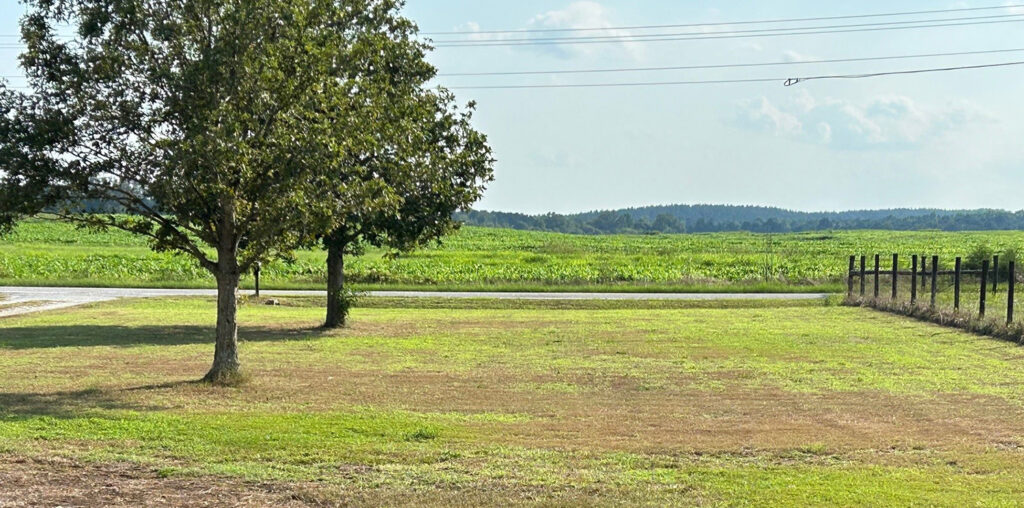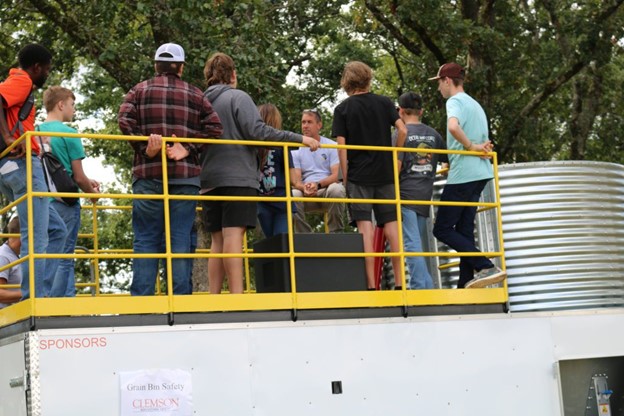Lauren Venegas Black
4H Agent for Saluda County
As we enter the New Year, we have been busy with numerous activities, competitions, and events. Our monthly clubs have been meeting and doing multiple activities.
For the month of January:
- Our after school Clubs made Valentine’s posters for our Nursing Home patients.
- Our cooking clubs learned how to make taco bites.
- Our Sewing Club started working on a reading pillow.
- Our Livestock Club learned about Horses.
School Enrichment:
- We are still partnering with Saluda Primary Elementary School to provide art to kindergarten – 5th grade once a month.
- We partnered with Hollywood Elementary School 4th grade to provide lessons on electricity and circuits through our Snap Circuits.
State Events and Competitions:
- Congratulations to Sarah Ann Crawford for being selected to compete in the State 4-H Presentation Contest.
- Congratulations to Makiyah Glymph on being selected as our Junior Poultry Record book Winner. She is now competing in the State Junior Poultry Record Book Contest.
- Congratulations to Sarah Ann Crawford on being selected as our Junior Wildlife Food Plot Record Book Winner. She is now competing in the State Junior Wildlife Food Plot Record Book Contest.
- We had several Juniors attend Junior Teen Weekend in February at Camp Long. Sarah Ann Crawford, Myla Long, Corley Jean Herlong, Caroline Berry, and Gillian O’Gorman. Mya Chapman also attended as a leader with the State Teen Council.
Upcoming Events and Projects:
South Carolina 4-H Engineering Challenge Overview
The event will be held at the South Carolina State Fairgrounds in Columbia, SC, on Wednesday, April 24, 2024, from 9 AM to 3:30 PM for youth ages 9-18 *. The SC 4-H Engineering Challenge began in 2012 and has grown annually to approximately 250 youth competitors! Youth who participated in this event reported increased confidence and knowledge in science skills. In addition to STEM-based
challenges for youth competition, there will be an interactive STEAM Expo from 11:00 AM – 3:00 PM.
4-H Poultry Project Offered
It’s that time of year again to sign up for the 2024 4-H Poultry Project. It may be cool now, but Spring will be here before you know it, and the days will get warmer. With the current price of eggs, there is no better time to teach our youth the fun of raising and showing chickens. For the new or veteran chicken grower, this 4-H project offers youth the opportunity to learn valuable lessons in caring for and maintaining a flock in a fun and engaging atmosphere.
Raising baby chicks from day one to egg-laying age can be a rewarding experience for our 4-H youth across South Carolina. The 4-H Poultry Projects are open to all youth ages five to eighteen. Each county Clemson Extension office and 4-H Program will have registration information. Contact Steve Huck, Region Poultry Project Coordinator (chucks@clemson.edu), or Saluda County 4-H Agent at lblack4@clemson.edu.
The 4-H Pullet Chain has been one of our most popular projects, and other than feed and shelter, it does not require an abundance of time or expense. Registration is open through March 3, 2024. Youth can order chicks in quantities of twelve ($45) or twenty-five ($85) to raise over the summer. Chicks will arrive in early May. This year’s breeds of chicks are Golden Comet, Rhode Island Red, and Barred Plymouth Rock. Each breed is a reliable layer. We encourage families to research before deciding which breed will be best for their 4-H project and as their backyard flock.
Successful completion of the Pullet Chain project requires record keeping, showing at least one show, and returning a portion of the birds at the end of the project for auction. If you order 12 birds, you will return three birds to 4-H. If you order 25 birds, you will return five birds to a final 4-H Pullet Chain Auction, typically held after show season. Once the above is complete, the youth’s registration deposit is returned, and the remaining birds are theirs to keep for free. Proceeds from the auction help offset the cost of offering the project and all prizes/awards given throughout the year. Youth will also have opportunities to exhibit their poultry knowledge or showcase their 4-H project experience by participating in various educational opportunities leading up to the final show.
Also offered this year is the 4-H Laying Flock Project. The Laying Flock Project is for the youth who already have chickens at home and are not interested in ordering chicks from 4-H this year or they acquire them on their own by May 1, 2024. Participants have the same opportunities to show as those in the Pullet Chain. Participating in the Laying Flock Project costs $10 for 4-H members, and registration is open through May 1, 2024.
Youth registering for the SC 4-H Poultry Projects must also register and pay for their SC 4-H Membership at www.v2.4honline.com. The membership allows youth to participate in other 4-H projects offered for the year, including clubs, projects, and summer camps. The Clemson University Cooperative Extension Service offers programs to people of all ages, regardless of race, color, sexual orientation, religion, national origin, disability, political beliefs, gender identity, marital or family status, and is an equal opportunity employer.
The 4-H Poultry Project, like our other animal projects, is a rewarding experience for young people. They learn responsibility and a vast array of life skills that will help them grow into versatile, well-rounded adults. 4-H animal projects, such as the 4-H Poultry Project, encourage the process of “discovery” of knowledge and solutions and build competence and confidence.
Youth must complete the poultry registration online to participate in the 4-H poultry projects. Assistance is available through local Clemson Extension Offices or online at https://www.clemson.edu/extension/4h/programs/ag-animals/livestock/poultry.html.
South Carolina 4-H Dairy Judging Contest
This event is open to South Carolina 4-H youth (5-18 years old as of January 1, 2024). Current 4-H membership is required for participation in this event. This evaluation contest will be held on Friday, March 22, at the T. Ed Garrison Arena, Pendleton, SC (1101 West Queen Street, Pendleton, SC, 29670). Please review the provided contest information below.
General Information
1. The contest check-in will be at 11:30 am, orientation is at 12:00 noon, and the contest will begin at 12:30 pm.
2. The awards program will be held after the contest.
3. All entries must be completed online by March 8, 2024. No late entries will be accepted. Corrections and substitutions will be accepted on the day of the contest. Refunds are available up to seven days before the event.
4. There will be a $15 registration fee for each individual or $45 per team (minimum of three, maximum of four team members.) Registration must be made online with a credit/debit card.
5. Any additional communication for the event will be made through the email address provided in the registration.
6. This event does not assume custodial care of youth in attendance. Parents, guardians, or chaperones must be present to supervise participants. Coaches will be responsible for providing meals/snacks for their youth.
7. Each contestant must bring two (2) sharpened No. 2 pencils as their writing instrument(s) and a clipboard/blank steno/notepad.
8. Direct questions to Tina Horn (Contest Superintendent) at thorn@clemson.edu and Heather Shultz at hkshult@clemson.edu.
2024 SC 4-H Small Garden Project
The 2024 SC 4-H Small Garden Project is now open for South Carolina youth registration. This project is a hands-on, environmental education program and a competitive, independent-study project that allows youth ages 5 through 18 an opportunity to establish, maintain, and harvest a small garden. The purpose of the Small Garden Project is to educate the youth of South Carolina on where and how their food is grown using hands-on, in-the-garden experiences.
Youth will set goals and plan activities and strategies to achieve those outcomes, even facing challenges. They will reflect on their work by documenting their skill development and learning experiences. They will give back to their communities through educational and service activities. Participating in this project will teach youth valuable record-keeping, financial management, and communication skills. They will ultimately become good stewards of the environment and gain technical expertise that can promote beneficial practices.
The cost is $25 for current 4-H members (non-members will be expected to enroll in 4HOnline for the 2023-2024 club year). If you would like to participate but do not have available land, your local Extension office may be able to help you locate a landowner or public space that could be made available to you.
Once youth register, 4-H will supply participants with a garden starter kit and other educational materials. Participants must plant at least two other crops of their choice. Participants will receive a printed project record book and newsletters/informational resources to help along the way.
Hurry! The deadline to register is Friday, April 5, 2024.
Contact your local Clemson Extension County office or visit the SC 4-H Small Garden Project Website: https://www.clemson.edu/extension/4h/program-areas/natural-resources/small-garden-project.html for more information and online registration.
Contact your 4-H agent for more information! Lblack4@clemson.edu




 On April 2nd, 2024, the Greenwood County Extension office and the Greenwood Soil and Water Conservation District held a Winter Forages Field Day at the Henderson Farm in Ninety Six, SC. Planning for this event began in the fall of 2023 with the planting of a winter annual variety trial. In total, twenty-three different varieties of small grains, ryegrasses, and legumes were planted. Variety trials give producers a side-by side comparison of different forages, so they are more educated about their choices of forages before they purchase seed for themselves. Planting was conducted in late October on a plot of two acres. The field day began with a showcase of the forage variety trial given by Greg Henderson (Greenwood County Soil & Water Conservation District board member and retired Clemson Extension Agent), Dr. Liliane Severino da Silva (Forage Specialist, Clemson Extension), and Reid Miller (Livestock and Forages Agent, Clemson Extension). The next section of the field day was a pasture soil fertility discussion over an intensively grazed pasture of winter annuals given by Greg Henderson and Reid Miller. The last part of the program was an NRCS cost share program update given by Myra Jones with American Forest Management. In total, we had forty people in attendance from Greenwood, Laurens, McCormick, Abbeville, and Edgefield Counties, and all producers involved in the Climate-Smart program received credit for their attendance.
On April 2nd, 2024, the Greenwood County Extension office and the Greenwood Soil and Water Conservation District held a Winter Forages Field Day at the Henderson Farm in Ninety Six, SC. Planning for this event began in the fall of 2023 with the planting of a winter annual variety trial. In total, twenty-three different varieties of small grains, ryegrasses, and legumes were planted. Variety trials give producers a side-by side comparison of different forages, so they are more educated about their choices of forages before they purchase seed for themselves. Planting was conducted in late October on a plot of two acres. The field day began with a showcase of the forage variety trial given by Greg Henderson (Greenwood County Soil & Water Conservation District board member and retired Clemson Extension Agent), Dr. Liliane Severino da Silva (Forage Specialist, Clemson Extension), and Reid Miller (Livestock and Forages Agent, Clemson Extension). The next section of the field day was a pasture soil fertility discussion over an intensively grazed pasture of winter annuals given by Greg Henderson and Reid Miller. The last part of the program was an NRCS cost share program update given by Myra Jones with American Forest Management. In total, we had forty people in attendance from Greenwood, Laurens, McCormick, Abbeville, and Edgefield Counties, and all producers involved in the Climate-Smart program received credit for their attendance.
